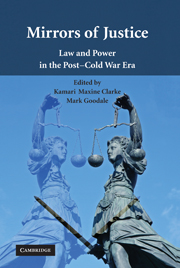Book contents
- Frontmatter
- Contents
- Editor Biographies
- Contributors
- Acknowledgments
- Introduction: Understanding the Multiplicity of Justice
- 1 Beyond Compliance: Toward an Anthropological Understanding of International Justice
- PART I JUSTICE AND THE GEOGRAPHIES OF INTERNATIONAL LAW
- 2 Postcolonial Denial: Why the European Court of Human Rights Finds It So Difficult to Acknowledge Racism
- 3 Proleptic Justice: The Threat of Investigation as a Deterrent to Human Rights Abuses in Côte d'Ivoire
- 4 Global Governmentality: The Case of Transnational Adoption
- 5 Implementing the International Criminal Court Treaty in Africa: The Role of Nongovernmental Organizations and Government Agencies in Constitutional Reform
- 6 Measuring Justice: Internal Conflict over the World Bank's Empirical Approach to Human Rights
- PART II JUSTICE, POWER, AND NARRATIVES OF EVERYDAY LIFE
- PART III JUSTICE, MEMORY, AND THE POLITICS OF HISTORY
- Epilogue: The Words We Use: Justice, Human Rights, and the Sense of Injustice
- Index
- References
6 - Measuring Justice: Internal Conflict over the World Bank's Empirical Approach to Human Rights
Published online by Cambridge University Press: 25 January 2010
- Frontmatter
- Contents
- Editor Biographies
- Contributors
- Acknowledgments
- Introduction: Understanding the Multiplicity of Justice
- 1 Beyond Compliance: Toward an Anthropological Understanding of International Justice
- PART I JUSTICE AND THE GEOGRAPHIES OF INTERNATIONAL LAW
- 2 Postcolonial Denial: Why the European Court of Human Rights Finds It So Difficult to Acknowledge Racism
- 3 Proleptic Justice: The Threat of Investigation as a Deterrent to Human Rights Abuses in Côte d'Ivoire
- 4 Global Governmentality: The Case of Transnational Adoption
- 5 Implementing the International Criminal Court Treaty in Africa: The Role of Nongovernmental Organizations and Government Agencies in Constitutional Reform
- 6 Measuring Justice: Internal Conflict over the World Bank's Empirical Approach to Human Rights
- PART II JUSTICE, POWER, AND NARRATIVES OF EVERYDAY LIFE
- PART III JUSTICE, MEMORY, AND THE POLITICS OF HISTORY
- Epilogue: The Words We Use: Justice, Human Rights, and the Sense of Injustice
- Index
- References
Summary
How can we measure justice? Are there tensions between an instrumental and an intrinsic conception of justice? These questions are currently being debated within the World Bank, an international development agency founded in 1946 under a mandate of poverty reduction. On May 15–16, 2006, members of the Bank's Legal Department led a workshop on developing justice indicators that examined these questions. The participants included thirty Bank employees, the Nordic-Baltic Foreign Ministries, and experts from four continents. The Bank organized the workshop in preparation for a new trust fund on justice and human rights, aimed at the “practical” promotion of human rights considerations at the institution. One of the objectives of the workshop was to “consider ‘what measuring justice means,’ including both the objective of and methodologies for doing so.”
The Measuring Justice Initiative, which attempts to quantify the performance of the justice sector in developing countries, is part of a larger trend in the Bank to empirically measure normative concepts. My research focuses on the institution's empirical treatment of human rights and its support for an instrumentalist interpretation of the concept. One example of this recent approach is the Bank's Human Rights Indicators Project, a parallel initiative to Measuring Justice, which began in 2005 and is also based in the Legal Department. This project aims to develop a methodology and operational tools to measure and assess human rights and integrate them into development processes.
- Type
- Chapter
- Information
- Mirrors of JusticeLaw and Power in the Post-Cold War Era, pp. 131 - 146Publisher: Cambridge University PressPrint publication year: 2009
References
- 6
- Cited by



